“Because of the foreign language foundation at Rivermont, I was able to double major in Elementary Education and Spanish and am now pursuing a bilingual teaching certificate. Rivermont was also a great place to be involved – I cannot think of any other school environment where someone could be in student council, drama productions, cheerleading, and choir at the same time. These activities helped build great friendships and also taught me how to balance the many projects I encounter in my professional life.”
Jennifer Neff, Class of 2003
9th through 12th Grade
Rivermont’s Upper School provides a rigorous, integrated college prep curriculum in a supportive environment. Our climate of high expectations creates positive peer pressure for excellence in academics, arts, athletics, and character.
Upper School focuses on preparing students with the critical thinking, problem-solving, and writing skills necessary for success in college and the global job market. The Upper School curriculum provides an increasing degree of choice and challenge as students progress. A broad base of knowledge in English, history, science, math, foreign language, and the arts is combined with a wide variety of honors, independent study, and Advanced Placement (AP) courses.
While the curriculum is intensive, much support and assistance are available. Advisors work closely with students to help develop their academic plans and choose the array of courses that best suit their strengths and goals. In addition, Rivermont’s thorough, personalized college counseling program is an invaluable resource, educating every student and family on the intricacies of the college planning process and playing an active role in every phase. Learn more about College Counseling.
The diversity, in and out of the classroom, develops each student into a well-rounded adult. Students are encouraged to stretch themselves, explore new ideas, and take risks in academics, athletics, and arts. Rivermont is a community where all members think – and act – outside the box.
100% of Rivermont graduates are accepted to 4-year colleges and universities. Rivermont graduates are accomplished and independent learners, possessing the knowledge, creativity, confidence, character, and global perspective to meaningfully contribute to their college communities and the world beyond.
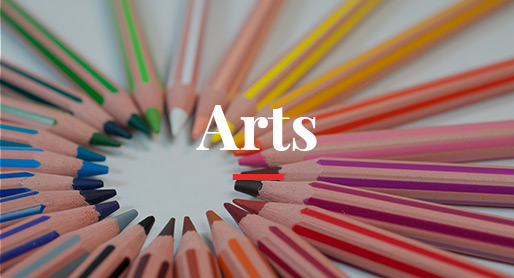
Upper School Arts Curriculum
STUDIO ART: 2D
In Studio Art: 2D, students practice a variety of art processes on two-dimensional surfaces. Students grow their drawing skills, examine a variety of visual ideas, and expand their creative problem solving skills by exploring drawing materials, techniques, methods, and concepts. Students maintain a sketchbook journal that bridges the gap between the brain and final artwork, organizes thoughts, and provides resources for inspiration.
Students practice proper discourse for art critiques and fine tune their visual vocabulary. Students also explore historical and contemporary artists’ work in order to understand the extensive realm of drawing and two-dimensional design and acquire an overview of a variety of artists who utilize drawing media. Students share their artwork with a large audience during the annual Family Art Night and All School Art Show, as well as a variety of art exhibition and competition opportunities in the community.
STUDIO ART: 3D
In Studio Art: 3D, students experiment with a variety of sculptural techniques, using both conventional and unconventional sculpting materials and tools. Projects include altered books, ceramic vessels, sculpting with color, the art of bobble heads, and a famous portrait mini gallery.
Students practice proper discourse for art critiques and develop an artist statement explaining the motives for their work. Students also explore historical and contemporary artists’ work in order to understand the extensive realm of three-dimensional design. Students share their artwork with a large audience during the annual Family Art Night and All School Art Show, as well as a variety of art exhibition and competition opportunities in the community.
FIBER ARTS
In Fiber Arts, students are introduced to the principles and elements of design through the use of a variety of paper and fiber media. Students explore paper cutting, weaving, collage, sewing, and sculpture. Students begin the course creating artist trading cards that are reflective of their interests and also combine a variety of materials to create fabric story quilts. Students incorporate fabric, sewing, beading, gluing, and water soluble pastels into their work. Other projects include paper molas inspired by the Kuna women of the San Blas Islands, puppets, and linear representations of family through family trees.
Students compose artist statements that explain the processes, motives, inspirations, influences, and overall idea behind their artwork. Students also explore historical and contemporary artists’ work in order to understand the extensive realm of the fiber arts. Students share their artwork with a large audience during the annual Family Art Night and All School Art Show, as well as a variety of art exhibition and competition opportunities in the community.
PRINT MAKING
In Printmaking, students are introduced to the principles and elements of design through a variety of printmaking techniques, including stenciling, dry point, block printing, woodcut, and screen printing. Students create a portfolio of prints, learn how to properly number and sign a series of work, and participate in collaborative works of art.
Students explore printmaking’s place in contemporary culture and also explore historical and contemporary artists’ work in order to understand the extensive realm of printmaking. Students share their artwork with a large audience during the annual Family Art Night and All School Art Show, as well as a variety of art exhibition and competition opportunities in the community.
THEATER ARTS / DRAMA (10TH – 12TH GRADE)
In this performance-based course, Upper School students work as actors and members of the production staff for the annual Upper School Play. From acting parts to scene, costume, and lighting design, there is truly something for everyone. Participation in rehearsals, production meetings, and public performances of the Upper School Play are expected of all students in the course.
UPPER SCHOOL BAND (9TH – 12TH GRADE)
Upper School Band is a wonderful group of dedicated instrumentalists. Students develop an essential command of rhythmical independence, necessary for selections that demand multiple patterns to be performed simultaneously. Many Upper School Band students bring keyboard skills to the ensemble and utilize those skills in performances. A common love of music and playful banter amongst the ensemble creates a special camaraderie and true sense of teamwork. Performance opportunities include school concerts, as well as regional community events.

Upper School Computer Science / Technology Curriculum
MULTIMEDIA APPLICATIONS AND MULTIMEDIA PROGRAMMING
In the Multimedia courses, students learn to use the tools necessary to create professional documents and presentations. The courses explore concepts of design, layout, typography, and graphics. Specific units of study include advanced word processing and presentation software, video creation and editing software, and advanced database software.
AP COMPUTER SCIENCE A
In AP Computer Science A, students learn to design and implement computer programs that solve problems relevant to today’s society, including art, media, and engineering. Students learn to apply programming tools and solve complex problems through hands-on experiences and examples. Fundamental topics include problem solving, design strategies and methodologies, organization of data (data structures), approaches to processing data (algorithms), analysis of potential solutions, and the ethical and social implications of computing. Students in this course are expected to take the AP Computer Science A exam offered each spring.
UPPER SCHOOL ROBOTICS (9TH – 12TH GRADE)
A select group of Upper School students participate in the FIRST Tech Challenge (FTC) competition each year. These students are tasked with designing, building, and programming a robot to accomplish specific tasks on a 12’x12′ playing field. FTC team members learn to think like engineers as they go through the process of prototyping, building, and testing their robot. Teams around the world all receive the same robot kit, but without any instructions. Instead, they’re given a manual about the game and how the robot must play. The games change every year! FTC not only provides invaluable hands-on experience in science, technology, engineering, and math, but also builds confidence and develops teamwork and interpersonal communication skills.
Students form teams each fall and practice 1-2 times per week until competition begins in late winter. Teams have the opportunity to compete with their robots in head-to-head competition at the local, regional, and national level.
For more information on FIRST Tech Challenge, click here.
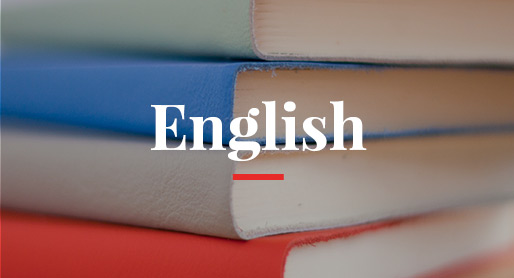
Upper School English Curriculum
ENGLISH I & II (9TH – 10TH GRADE)
English I & II combine literature and presentational skills. In literature, students focus on major works of modern American and world authors. The purpose of this course is to teach students how to read, interpret, and write about literature. Although analysis of literary texts is the main focus, attention is also paid to cultural and historical contexts. Readings may include such works as Lorraine Hansberry’s A Raisin in the Sun, Jerome Lawrence and Robert E. Lee’s Inherit the Wind, and Arthur Miller’s The Crucible.
Students are also introduced to the elements of communication, including vocal production and listening. Acting and teambuilding exercises develop poise and build confidence in a variety of speaking and performance situations. Students study and prepare powerful, persuasive writing. They review expository patterns and research protocol, as well as analyze language use. The Norton Field Guide to Writing serves as a resource.
COLLEGE ENGLISH I & II (11TH & 12TH GRADE)
College English I and II (each a yearlong course) offer a glimpse into the literature and traditions of cultures outside of the Anglo-American tradition. Course curriculum strongly emphasizes writing, analytical thinking skills, and effective communication techniques necessary for college-level courses; assignments and goals are similar to those expected at the college level. Writing portfolios, class discussions, and self-assessments are required.
AP ENGLISH LANGUAGE & COMPOSITION (11TH & 12TH GRADE)
AP English Language & Composition aligns to an introductory college level rhetoric and writing curriculum. The course focuses on the development and revision of evidence-based analytic and argumentative writing and the rhetorical analysis of nonfiction texts.
Readings may include such works as Mary Wollstonecraft Shelley’s Frankenstein, Charlotte Perkins Gilman’s “The Yellow Wall-paper,” and Kate Chopin’s The Awakening. Students in this course are expected to take the AP English Language & Composition exam offered each spring.
AP ENGLISH LITERATURE & COMPOSITION (11TH & 12TH GRADE)
AP English Literature & Composition aligns to an introductory college level literary analysis course. The course focuses on reading, analyzing, and writing about imaginative literature (fiction, poetry, drama) from various periods. Students in this course are expected to take the AP English Literature & Composition exam offered each spring.

Upper School Mathematics Curriculum
GEOMETRY
In Geometry, students are actively engaged in guided and open-ended math investigation. This course covers the recognition, understanding, and use of geometric properties and relationships among points, lines, planes, angles, triangles, quadrilaterals, and other polygons of Euclidean geometry. Students complete algebraic, coordinate, and deductive proofs of these relationships and study measurements of both two and three-dimensional figures.
ALGEBRA II
In Algebra II, students build on algebraic and geometric concepts. The course extends topics from Algebra I and provides advanced skills in algebraic operations. Matrices, imaginary and complex numbers, quadratics, conic sections, exponential and logarithmic functions, graphing, trigonometric functions, and sequences and series are explored.
PRE-CALCULUS
In Pre-Calculus, students build on Algebra II curriculum as a preparation for Calculus. Specific units of study include the advanced study of functions (polynomial, rational, logarithmic, and exponential), sequences, series, and probability.
Math electives include Statistics.
AP CALCULUS AB
AP Calculus AB is a rigorous math course designed for advanced students. The course studies both the theoretical and practical applications of calculus. Specific units of study include properties of analytic geometry, transcendental functions, limits, derivatives, and definite integrals. Students in this course are expected to take the AP Calculus AB exam offered each spring.
AP CALCULUS BC
AP Calculus BC is a capstone course that builds on Calculus AB curriculum. Specific units of study include advanced integration techniques, polar and parametric equations, sequences and series, and a more in-depth study of differential equations and slope fields. Students in this course are expected to take the AP Calculus BC exam offered each spring.
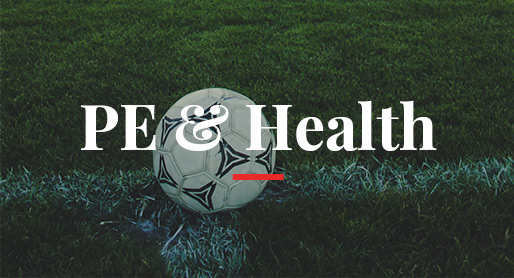
Upper School Physical Education & Health Curriculum
Rivermont’s P.E. curriculum helps ensure students are healthy and physically fit and understand that being active is an essential part of leading a healthy, productive life. Students develop physical fitness, useful physical and athletic skills, good sportsmanship, and an enjoyment of physical recreation. Upper School students complete at least 4 semesters of P.E. (or 2 credits based on a 120-point system).
By the time they reach Middle and Upper School, students have developed a solid foundation of skills in a variety of sports and may choose to participate in school-sponsored athletics.
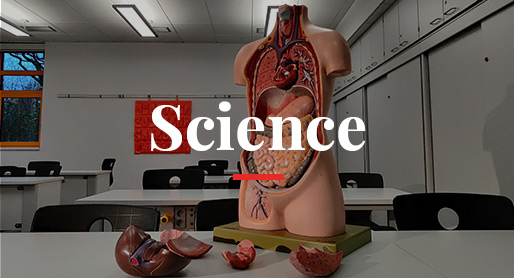
Upper School Science Curriculum
Biology (9th Grade)
In Biology, students focus on the fundamental study of living organisms. Specific units of study include biochemistry, the structure and function of cells, cellular reproduction and respiration, genetics, protein synthesis, photosynthesis, and ecology.
Chemistry (10th Grade)
In Chemistry, students are introduced to the principles of chemical reactions present in the physical world. Specific units of study include atomic theory, constructing chemical equations, stoichiometry, fundamental states of matter, and gas laws.
Physics (11th Grade)
In Physics, students are introduced to the fundamental concepts of kinematics and mechanics. Specific units of study include constant and accelerated motion, projectile motion, Newton’s laws of motion, momentum and impulse, electrostatics, electricity, and magnetism.
Anatomy (12th Grade) Elective
During the senior year, a variety of electives are available including Anatomy, AP Physics as well as AP Biology and AP Chemistry. In Anatomy, students study the body systems that maintain homeostasis from anatomical, physiological, and histological perspectives. Students explore anatomical and physiological concepts through an inquiry-based approach. Specific units of study include anatomical orientation, protection, support and movement, transportation, absorption and excretion, reproduction, growth, and development.
AP Physics 1 and 2 (11th & 12th Grade)
In AP Physics 1 and 2, students cover concepts typically included in an algebra-based, introductory college level physics sequence. Students develop a deep understanding of the field to support future college work in the sciences. Students are expected to take the respective AP Physics 1 or 2 exam offered each spring.
Specific units of study in AP Physics 1 include kinematics, dynamics: Newton’s laws, circular motion and universal law of gravitation, simple harmonic motion, impulse, linear momentum, and conservation of linear momentum, work, energy and conservation of energy, rotational motion, electrostatics, DC circuits, and mechanical waves and sound.
Specific units of study in AP Physics 2 include thermodynamics, fluid statics and dynamics, electrostatics, DC circuits and RC circuits, magnetism and electromagnetic induction, geometric and physical optics, quantum physics, atomic, and nuclear physics.
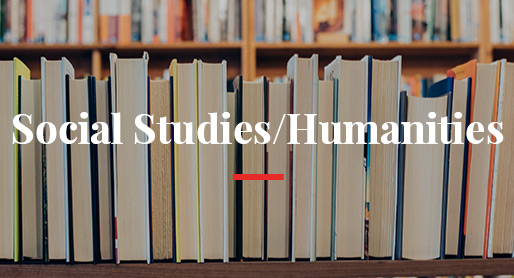
Upper School Social Studies/Humanities Curriculum
WORLD HISTORY (9TH GRADE)
The 9/10 World History course covers important events and people beginning with the Neolithic Revolution carrying into current day events that reflect on the occurrences of past governments, religious developments, migration patterns and geological influences. Students are encouraged to think critically about complex historical themes (rather than passively recite historical dates and events) and develop a comprehensive understanding of global history.
UNITED STATES HISTORY (9TH GRADE)
In United States History, students explore the important events and themes that have shaped the U.S. from early colonization to present day. An emphasis is placed on post-Civil War reconstruction through the 20th century, providing students a deep understanding of how our nation emerged as a global economic and political power. Individual and group research projects help students grasp the complexities of historical events and enhance research, writing, and teamwork skills.
GOVERNMENT & POLITICS (11TH GRADE)
In Government & Politics, the study of local, state, and national government prepares students for citizenship in a global community. Class discussion is focused on issues that will impact the world now and in the future. Global governance and the role of non-governmental organizations are discussed. Students develop an understanding of the current issues facing the global community by taking an in-depth look at U.S. and world politics from the beginning of the Cold War to the new millennium. Civil rights issues, armed conflicts, and the ever-changing social, economic, and political climate are examined and students have ample opportunity to engage in civil discourse.
INTRODUCTION TO PHILOSOPHY (SENIOR ELECTIVE)
In the senior year a variety of electives are offered based on student interest. Once such course is Introduction to Philosophy. This survey course covers important ideologies and thinkers in Philosophy, including but not limited to: Metaphysics/Rene Descartes, Rationalism/Plato, Kantian Ethics/Immanuel Kant and Justification of Government/John Locke. Students are encouraged to think critically about how our existence and thought processes are explained through discussion, debate and thought experiments.

Upper School World Languages Curriculum
INTRODUCTION TO CHINESE LANGUAGE & CULTURE
Introduction to Chinese Language and Culture introduces students to Mandarin Chinese. Students learn the unique tonal language and character-based written form using the PinYin Romanization curriculum, where the Roman alphabet is used as a bridge to learning Mandarin.
Students also explore Chinese history, culture, art, literature, cuisine, inventions, and current events. The course employs a variety of online applications to bring the Chinese language and culture alive for students. A selection of Chinese movies reinforces listening skills, while guest presentations and field trips to regional festivities enhance the course.
CHINESE I, II, AND III
Introduction to Chinese Language and Culture introduces students to Mandarin Chinese. Students learn the unique tonal language and character-based written form using the PinYin Romanization curriculum, where the Roman alphabet is used as a bridge to learning Mandarin.
Students also explore Chinese history, culture, art, literature, cuisine, inventions, and current events. The course employs a variety of online applications to bring the Chinese language and culture alive for students. A selection of Chinese movies reinforces listening skills, while guest presentations and field trips to regional festivities enhance the course.
FRENCH II
Building on 8th Grade French curriculum, French II students dive deeper into language structure with an increased emphasis on intonation, stress patterns, verb tenses, the command form, and the subjunctive mood. Literature is introduced through poetry and short stories. Students also explore French culture with celebrations of various French and Francophone holidays throughout the year.
FRENCH COMPOSITION
In French Composition, students review grammar, tense, and mood by using the language in everyday settings. Unabridged literature, newspapers, web sources, and magazine articles augment course curriculum. Students converse in French and continue listening activities, while also enhancing and perfecting writing skills in a variety of formats. Specific units of study include generation gaps, family issues, hobbies, interests, the environment, nature, media, justice, politics, arts, shopping, and sports. Students also explore French culture with celebrations of various French and Francophone holidays throughout the year.
FRENCH CONVERSATION
In French Conversation, students perfect their use of French as a communication tool with an emphasis on oral skills. The course is taught completely in French and students are expected to participate frequently in directed and free conversations. All presentations and research assignments are completed solely in French. Students also explore French culture with celebrations of various French and Francophone holidays throughout the year.
FRENCH LITERATURE AND FILM
French Literature and Film is the capstone course in the French language sequence. The course continues to refine students’ mastery of French through literature, cinema, and online applications. Students produce a short story and a short movie in French. Selected readings from Alexandre Dumas, Moliere, Albert Camus, Camara Laye, and Victor Hugo are an integral part of the course, in addition to both classic and contemporary French movies. Students also explore French culture with celebrations of various French and Francophone holidays throughout the year.
SPANISH II
Building on 8th Grade Spanish curriculum, students dive deeper into language structure with an increased emphasis on intonation, stress patterns, verb tenses, the command form, and the subjunctive mood. Literature is introduced through poetry and short stories. Students also explore a variety of cultures with celebrations of Spanish holidays throughout the year.
SPANISH COMPOSITION
In Spanish Composition, students review grammar, tense, and mood by using the language in everyday settings. Unabridged literature, newspapers, web sources, and magazine articles augment course curriculum. Students converse in Spanish and continue listening activities, while also enhancing and perfecting writing skills in a variety of formats. Students also explore a variety of cultures with celebrations of Spanish holidays throughout the year.
SPANISH CONVERSATION
In Spanish Conversation, students perfect their use of Spanish as a communication tool with an emphasis on oral skills. The course is taught completely in Spanish and students are expected to participate frequently in directed and free conversations. All presentations and research assignments are completed solely in Spanish. Students also explore a variety of cultures with celebrations of Spanish holidays throughout the year.
SPANISH LITERATURE
Spanish Literature and Film is the capstone course in the Spanish language sequence. The course continues to refine students’ mastery of Spanish through literature, cinema, and online applications with special emphasis on the countries of Spain, Mexico, and Argentina. Students also explore a variety of cultures with celebrations of Spanish holidays throughout the year.
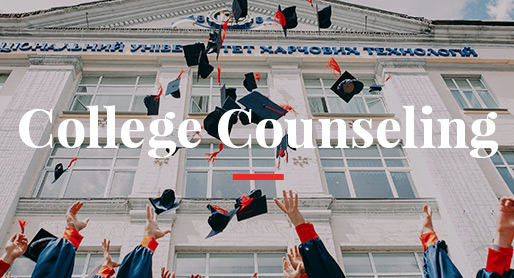
College Counseling Program
A strong academic advising and college counseling program in Middle and Upper School is essential to preparing our graduates for college. Academic scheduling that ensures a strong path toward the right fit college begins in the sixth grade. College Counseling begins in the eighth grade and proceeds through group and individual counseling with increasing individual attention to the application process in the senior year.
Rivermont’s curriculum prepares students for success at competitive colleges and universities. The college counseling program includes support in exploring college/university choices, applying for scholarships, engaging in challenging summer programs, choosing recommenders, and meeting all deadlines for regular and special programs. The program is structured and thorough. Both students and parents receive extensive personalized attention throughout the sometimes complicated college application process. The goal is to have all pieces of the application process in place by the fall of the senior year to ensure a smooth application process and diminish anxiety. Advising and counseling continue through college acceptance, Rivermont graduation, and even throughout life as an alumni. 100% of Rivermont graduates are accepted to 4-year colleges and universities.
Progression by Grade
- 6th and 7th grade: Begin career exploration.
- 8th grade: Spring meeting – understanding the transcript, exploring majors and colleges, exploring summer program options.
- 9th grade: Fall and spring meetings – beginning the résumé, exploring summer programs, taking and reviewing the PSAT 9 (April), selecting the most appropriate and rigorous course options for 9-12th grades.
- 10th grade: Fall and spring meetings – continue building the résumé through school and community engagement, taking and reviewing the PSAT 10 (April), possible summer program selection, consider completing the Rivermont Junior Project over the summer.
- 11th grade: Fall and spring meetings – PSAT workshop for October exam and completing a college questionnaire in preparation for spring junior level college conference -preparing an Excel spreadsheet of colleges with information and deadlines, polishing the résumé, choosing recommending teachers, writing essay prompts (the Common Application prompts, the Yale prompt, the University of Chicago prompt, the personal essay) understanding the Common Application through two workshops, exploring a challenging summer program, internship or research program.
- 12th grade: Fall meetings – individual guidance through the college application based on the preliminary work done in the junior year. A minimum of six college applications is required: two safe, two target, two reach schools. Guidance in early action and/or early decision applications, pre-med combined program guidance, gap year information, merit-based and financial need-based scholarship advice.
Testing Program
A suite of tests acts to track progress and pinpoint needs as students prepare for the SAT and ACT with Writing taken in the spring of the junior year: PSAT 9, PSAT 10, PSAT (juniors), SAT, and SAT Subject tests. Workshops preceding each test offer practice, and all students open a Khan Academy account for free test preparation.
Guidance
Individual conferences meet individual needs. Each year begins with an individual college conference. The conference gives an overview of the year, and timelines for the year, and provides a one-to-one opportunity to ask questions and share individual concerns.
Students and parents have unparalleled access to the college counselors; all juniors and seniors may text, email, or phone the college counselor with questions relating to scholarships, summer programs, and applications..
Recommendations
In the holistic approach to college applications which includes consideration of more than grades, tests, and rankings, teacher and counselor recommendations play a vital role. Teachers at Rivermont know their students, understand their students and thus are able to write supportive, individually crafted and detailed recommendations that speak to students’ strengths..
College Admissions Visits and College Fairs
All juniors attend informational college admission representative visits to Rivermont from small and large schools. Students and parents are encouraged to attend consortium visits from East and West coast schools as well as Midwest area college fairs..
Financial Aid
Our FAFSA/Financial Aid Night in the spring prepares both parents and students to file the FAFSA (Free Application for Federal Student Aid) in October and to explore scholarships. Scholarship information for juniors and seniors is regularly shared as received throughout the year. Free information and individual help in filing the FAFSA is available through ICAN- the Iowa College Access Network..
Parent Support
Throughout the College Counseling program, individual family meetings and information sharing relevant to each grade level is an ongoing offering. Parents are encouraged to call, visit, text, and email the college counselor. Information sent to students is copied to parents through emails and information from group sessions is summarized and shared with parents..
International Student Support
Rivermont Collegiate is an approved Student Visitor and Exchange Program school. Both the college counselor and the Director of Admissions are certified by the Department of Homeland Security to initiate and produce the Form I-20 through the SEVIS Student and Exchange and Visitor Information System.
College Counseling guides international students and their parents through the special college application procedures for international students.
